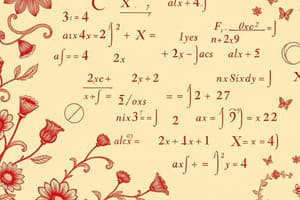Podcast
Questions and Answers
What is the basic operation that involves finding the value of unknowns by manipulating expressions and isolating variables?
What is the basic operation that involves finding the value of unknowns by manipulating expressions and isolating variables?
- Multiplication
- Division
- Addition (correct)
- Subtraction
Which type of equation is represented by the form ax + b = c?
Which type of equation is represented by the form ax + b = c?
- Linear equation (correct)
- Quadratic equation
- Polynomial equation
- Exponential equation
What method is typically used to solve polynomial equations?
What method is typically used to solve polynomial equations?
- Square root method
- Logarithmic method
- Exponential method
- Synthetic division (correct)
Which type of equation represents a parabola on the Cartesian plane?
Which type of equation represents a parabola on the Cartesian plane?
What is the primary purpose of solving systems of linear equations?
What is the primary purpose of solving systems of linear equations?
What is the origin of the word 'algebra'?
What is the origin of the word 'algebra'?
Who is the mathematician credited with publishing a book that laid the foundations for algebra?
Who is the mathematician credited with publishing a book that laid the foundations for algebra?
What significant mathematical concept allows equations to generalize and solve diverse problems?
What significant mathematical concept allows equations to generalize and solve diverse problems?
Which discipline uses equations, variables, and their relationships extensively to solve problems?
Which discipline uses equations, variables, and their relationships extensively to solve problems?
What is considered the heart of algebra?
What is considered the heart of algebra?
Study Notes
Exploring Math: A Glimpse into Algebra
Algebra, a cornerstone of modern mathematics, has been shaping the way we think and solve problems for centuries. It's an intricate and versatile discipline that weaves together equations, variables, and their relationships. To grasp algebra, we'll first take a bird's-eye view of its origins and evolution, then dive into its fundamental concepts.
The Origins of Algebra
Algebra, born from the Arabic word "al-jabr," evolved from ancient Babylonian mathematics and the work of early Muslim mathematicians. They introduced new techniques to solve linear and quadratic equations, setting the stage for algebra's development. Al-Khwarizmi, a 9th-century mathematician, published his book "Hisab al-Jabr wa'l-Muqabala," which taught methods for solving linear and quadratic equations. This work, along with the contributions of other mathematicians like Diophantus and Al-Biruni, laid the foundations for algebra.
Generalizing with Variables
One of algebra's most significant advances is the use of variables. These placeholders allow us to generalize equations and solve problems that don't follow a specific pattern. Variables give algebra its power to describe, analyze, and solve a wide range of mathematical problems, from simple linear equations to complex multivariate systems.
Solving Equations and Manipulating Expressions
At the heart of algebra is the process of solving equations. We learn to manipulate expressions and isolate variables to find the value of unknowns. Basic operations like addition, subtraction, multiplication, and division form the foundation of this process. More complex techniques, like factoring and combining like terms, allow us to solve equations efficiently and understand their solutions.
Linear Equations
Linear equations, of the form (ax + b = c), are the simplest equations in algebra. Solving these equations requires first isolating the variable, (x), and then plugging in a value for (x) to find the corresponding value of (y) (if there is one). Linear equations form the backbone of algebra and are fundamental in understanding more complex equations.
Quadratic Equations
Quadratic equations, of the form (ax^2 + bx + c = 0), represent a parabola on the Cartesian plane. Solving quadratic equations involves factoring, completing the square, or using the quadratic formula. Like linear equations, quadratic equations are essential for understanding more advanced algebraic concepts.
Systems of Linear Equations
Systems of linear equations, where two or more equations share a common set of variables, are a staple of algebra. Solving these systems allows us to find relationships between the variables and determine the unique solutions that satisfy all the equations within the system.
Polynomial Equations
Polynomial equations represent a function's behavior over a specific interval. Solving polynomial equations can be complex, and the methods used to solve these equations depend on their degree. Methods for solving polynomial equations involve factoring, synthetic division, and the application of the Fundamental Theorem of Algebra.
Algebra offers a powerful, flexible, and adaptable toolset for understanding and solving real-world problems. It's the foundation that supports higher mathematics and serves as a catalyst for analytical and abstract thinking skills. By exploring algebra's fundamental concepts, we open the door to a world of mathematical possibilities.
Studying That Suits You
Use AI to generate personalized quizzes and flashcards to suit your learning preferences.
Description
Test your knowledge of algebra from its historical origins and evolution to fundamental concepts like variables, equations, and polynomial equations. Explore the world of linear equations, quadratic equations, systems of linear equations, and polynomial equations.




